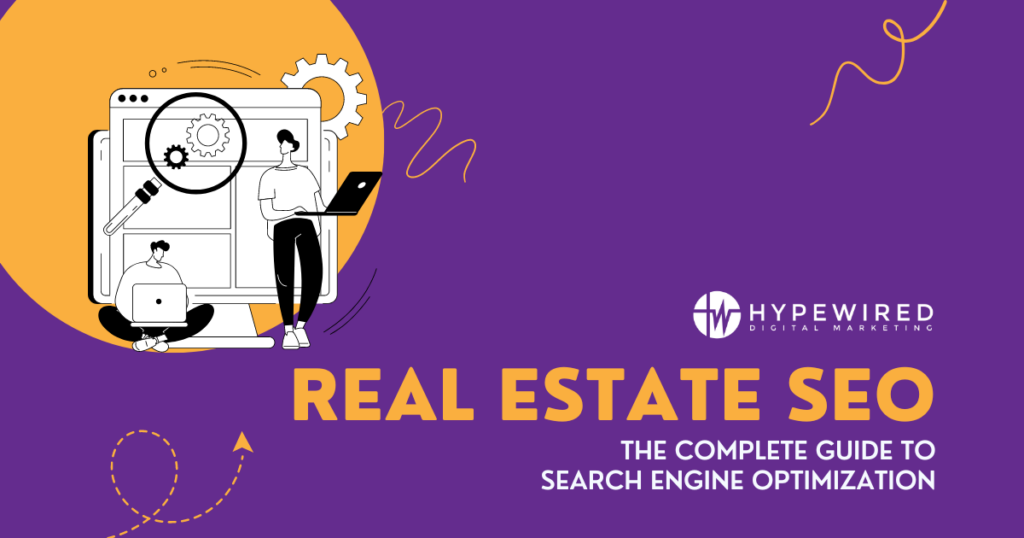Are you a real estate agent wanting to increase organic traffic and leads for your website? SEO is essential to any digital marketing strategy, but it can be complex if you don’t know where to start. From keyword research, on-page optimization, content creation, link building, local SEO tactics, and mobile optimization, this comprehensive guide covers everything required for successful search engine optimization in the real estate industry. Follow the steps below and watch as your site rises through the rankings.
Keyword Research
Keyword research is an essential part of any real estate SEO strategy. By researching the right keywords, you can create content that will attract organic traffic and help your website rank higher in search engine results pages (SERPs).
The first step to successful keyword research is identifying relevant terms related to your business. Consider what potential customers might be searching for when looking for a real estate agent or property listings in your area. You can use tools like Google Keyword Planner or SEMrush to determine which keywords are most popular among searchers. Once you have identified some target keywords, it’s time to start optimizing your content around them.
When creating content, ensure each page has one primary keyword that should appear throughout the text and other related terms that searchers may use. Doing so will ensure your pages are optimized for those specific terms and increase their chances of appearing in SERPs when someone searches using those words or phrases.
On-Page Optimization
On-page optimization is a critical factor in achieving higher search engine rankings. It involves optimizing web pages’ content and HTML source codes to ensure search engines properly index them. This includes using meta tags, title tags, header tags, and other elements to ensure your website is optimized for users and search engine crawlers.
Meta Tags
Meta tags provide information about a page’s content, such as its title, description, and keywords. These are important for SEO because they help search engines understand what your page is about so it can rank accordingly.
Title Tags
Title tags should include relevant keywords related to the page’s topic and should be kept short, about 60 characters or less. They appear at the top of each webpage in a browser window and also appear in SERPs when someone searches for terms related to your site’s content.
Header Tags
Header tags (H1-H6) divide sections within a webpage into smaller parts, making them easier to read while providing a structure to help with SEO efforts because it allows targeted keywords to appear throughout different sections of your web pages without overusing them or appearing spammy.
Content Creation
Content creation is an essential part of any real estate website. It helps inform potential customers about the services you offer and build trust and credibility in your brand. Here are some tips for creating compelling content.
Blog Posts
Blogging is a great way to share helpful information with your audience and establish yourself as an expert. When writing blog posts, ensure they are informative and engaging by using visuals such as images or videos, breaking up text into smaller paragraphs, and including relevant keywords throughout the post. Additionally, use internal links to direct readers to other pages on your site that may interest you.
Videos
Videos can showcase properties or provide virtual tours of homes for sale. They also help create a more personal connection with viewers because they can see you talking directly about topics related to real estate. To maximize engagement with video content, keep it short (under two minutes) and focus on one topic at a time, so viewers don’t get overwhelmed with too much information all at once.
Infographics are visually appealing content that allows you to convey complex concepts in an easy-to-digest format quickly. Use infographics when discussing topics like market trends or home-buying tips. Doing so will help simplify complicated data points while still providing valuable insights for readers who may not have experience in the industry but want to learn more about it before making any decisions regarding their next purchase or sale transaction.
Link Building
Link building is an essential part of any SEO strategy. It involves creating links from other websites to your own, which helps increase organic traffic and boost search engine rankings. By creating quality backlinks, you can establish yourself as a trusted source in the industry and drive more people to your website.
The key to successful link building is finding relevant websites with high domain authority (DA). This means these websites are trustworthy by Google and other search engines, so it’s essential to focus on getting links from these sites first. You can use tools like Moz or Ahrefs to check the DA of potential link partners before reaching out.
Once you’ve identified some potential link partners, it’s time to start outreach. Reach out with personalized emails explaining why linking back would benefit both parties. This could include sharing content or offering discounts on services, if applicable. Ensure you provide a direct URL where the link should be placed so there’s no confusion about what page should be linked back to yours.
It’s also essential to focus on quality. Ensure all links come from reputable sources and are relevant in terms of topic or industry-related keywords.
Finally, track progress regularly with analytics software such as Google Analytics or SEMrush to see how much traffic each new backlink brings in over time. This will help inform future decisions around which types of sites work best for your business when generating leads through SEO efforts like link building.
Local SEO
Local SEO is an essential strategy for real estate agents targeting potential customers in a specific geographic area. It involves optimizing your website and content to make it easier for local customers to find you online. Here are some tips on how to get started:
Optimize Google Business Profile Listings
Having an up-to-date, optimized Google Business profile listing is critical when it comes to local SEO. Ensure all the information listed is accurate and complete, including your address, phone number, hours of operation, services offered, and more. You should also add photos of your office or properties available so potential customers can get a better idea before contacting you.
Use Local Citations
Local citations mention your business name, address, and phone number (NAP) across the web — think directories like Yelp or Yellow Pages and other websites listing businesses in the area. The more consistent these listings are across different sites (i.e., same NAP info), the better off you’ll be with search engines like Google who use this data when determining rankings for local searches related to real estate agents in a particular area.
Create Location-Specific Content
Creating content focusing on specific locations can help boost your ranking for those areas and provide valuable information about neighborhoods or communities where potential buyers may be interested in purchasing a property from you. Consider writing blog posts about current events happening around town or highlighting popular attractions near certain properties. These things will give readers insight into why living there could be beneficial for them and will go a long way towards helping build trust with prospective clients while boosting visibility at the same time.
Using geotags on images and videos associated with blog posts can help search engines understand where exactly they were taken, which helps them rank higher locally if someone searches “real estate agent near me” type queries within their browser window. It also adds another layer of relevance because viewers know exactly what kind of environment they’re viewing. Using structured data markup such as schema tags allows search engine crawlers access to additional information about your business, which again boosts visibility when people perform location-based searches related to real estate agents nearby.
Monitor Previous Client Reviews
Finally, don’t forget to monitor reviews left by previous clients online. This gives new prospects an idea of what to expect when working with you.
Encourage customers who have had positive experiences working with you to leave reviews online. The more reviews you receive, the higher your chances of potential clients finding out about the great service they could expect if they work with you.
Include Keywords Related to Locations
When writing content related to a particular geographic region, use keywords associated with that place throughout the copy like city names or zip codes whenever possible without overstuffing them into sentences unnaturally. This helps search engines better understand which queries should trigger results featuring your business instead of competitors located elsewhere
Mobile Optimization
Mobile optimization is an essential part of any successful real estate website. With the majority of web traffic now coming from mobile devices, it’s important to ensure your site looks great and functions properly on all devices. Optimizing for mobile will not only improve user experience but help you rank higher in search engine results pages.
- The first step to optimizing a real estate website for mobile is ensuring the content is responsive. Responsive design means your site automatically adjusts its layout depending on the size and type of device being used. This makes it easier for users to navigate and find what they are looking for quickly without having to zoom or scroll horizontally across the page.
- Another important aspect of mobile optimization is ensuring fast loading times. Mobile users tend to be more impatient than desktop users, so if your site takes too long to load, they may abandon it altogether in favor of another with faster speeds. To reduce loading times, try compressing images, minifying HTML code, and using caching techniques such as browser caching or server-side caching.
- Consider implementing Accelerated Mobile Pages (AMP) technology into your website design. AMP helps pages load faster on mobile devices by removing unnecessary elements like JavaScript code and large images while keeping key features intact like text formatting and embedded videos/images. Ensure all external links open in a new tab instead of redirecting away from the page entirely, which can significantly disrupt user experience when browsing from a smartphone or tablet device.
Analytics & Tracking
Analytics & Tracking is an essential part of any successful real estate business, as it allows agents to measure their marketing efforts’ success and make improvements over time. By tracking website performance metrics like page views, bounce rate, and conversion rates from organic traffic sources, agents can gain valuable insights into how visitors interact with their websites and what strategies are most effective for generating leads.
Tools like Google Analytics provide detailed reports on user behavior that can help agents understand where visitors are coming from and which pages they’re visiting most often. This data can identify areas of improvement or opportunities for optimization. Agents should also track the number of leads generated through organic search engine results pages to determine if their SEO efforts are paying off.
In addition to web analytics tools, there are other ways to track lead generation performance such as email campaigns or social media posts. By measuring open rates, click-throughs, and conversions from these channels, agents can better understand which tactics are working best for them and adjust accordingly.
Agents should also consider customer feedback when evaluating lead generation strategies; both positive and negative reviews offer valuable insight into what works well or not so well. Surveys sent after a sale or follow-up emails after a potential buyer has visited a property can provide additional information about what resonates with customers and how it could be improved upon in the future.
FAQs About Real Estate SEO
How do I do SEO for real estate?
SEO for real estate is a process of optimizing your website and content to rank higher in search engine results. This involves keyword research, creating relevant content, link building, and technical optimization such as improving page speed and mobile-friendliness. By doing this, you can increase organic traffic to your website, which leads to more potential customers discovering your services. By utilizing local SEO tactics such as claiming Google Business listings and optimizing for local keywords, you can target people in specific areas looking for real estate agents.
Is SEO good for real estate agents?
Yes, SEO is a great tool for real estate agents to generate leads! It helps them reach more potential clients and increase their visibility online. By optimizing their website content and using relevant keywords, they can ensure their listings appear higher on search engine results pages.
SEO techniques such as link building can help boost the credibility of a real estate agent’s website and make it easier for potential buyers to find them. Overall, SEO is an essential part of any successful lead-generation strategy for real estate agents.
Ready to Unlock Your Real Estate Site’s Potential with SEO?
By following the steps outlined in this guide to real estate SEO, you can optimize your website and content for organic search engine traffic. From keyword research to link building, mobile optimization, and analytics tracking, there are many ways to increase visibility on the web. With a comprehensive approach that takes into account all aspects of SEO, you can ensure your website is seen by more potential customers than ever before.

 February 28, 2023
February 28, 2023




